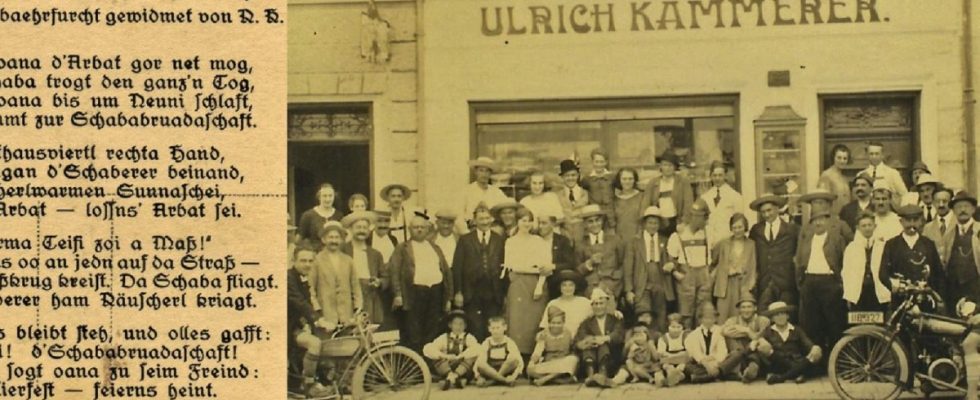The “Golden Twenties” are considered the heyday of the Weimar Republic, but there was high unemployment, particularly in rural areas. The Dorfen local historian Franz Streibl, who received the Erding District Culture Prize in 2022, made an interesting find in old documents. He came across an old photo of the Dorfen Scraper Brotherhood and a poem about them that was written exactly 100 years ago, in 1924. These scrapers were particularly craftsmen who had a job but no work. They met at Dorfen’s town hall square to discuss the bad times and to ask wealthier people to buy them a pint of free beer.
Those were difficult times back then. The economic situation after the end of the war in 1918 was desolate: the returning soldiers were looking for work, the war economy had to be quickly converted to peacetime production and the Allied victors confiscated important parts of the infrastructure with locomotives and wagons. Added to this was hyperinflation, which reached its peak in 1923. The introduction of the Rentenmark brought inflation under control, but the economy only recovered slowly.
People met with the scraper and the work apron
According to Streibl, the Schaberer Brotherhood came into being in the 1920s. His knowledge is partly based on stories from his mother, born in 1899, who was there as a young woman. In these bad times, craftsmen and businessmen had little to do. Due to a lack of work, people met at the town hall square and discussed the bad times. The men were also joined by children and young women from the surrounding houses, creating a fun company.
“Since the men all came from their place of work where there was no work,” writes Streibl, they had a scraper tied on them and a work apron, and that’s how the “scraper brotherhood” came about. This was based on the church brotherhoods that were common at the time and was not meant entirely seriously. “It was then said,” Streibl continued, “that it was part of a scraper’s code of honor never to move so fast that the scraper flew, unless of course there was free beer.”
Sleep until nine o’clock and sit in the sun
The local researcher and local poet Rudolf Kirmeyer, who wrote a poem about the Schaberers, also mingled with the Schaberers. In it he glorifies unemployment as something they want; they would rather sleep until nine o’clock, sit in the sun and let the beer mug swirl.
Local historian Rudolf Kirmeyer, author of the poem about the Dorfen scrapers.
(Photo: Streibl archive)
Kirmeyer was also one of them because he lived in the smallest house on Rathausplatz, next to the former Dichtl hairdresser’s shop, now Weilnhammer magazine. His parents were brush makers and his mother looked after the market scales until she moved to Munich. Kirmeyer was a creative mind who did a lot with the scrapers. He later became the director of the Bavarian Radio Children’s Choir.
In addition to the poem, Streibl also found a photo of the Schaberer Brotherhood. The names of many scrapers are handwritten. There are also numerous children and young people among them.
The trace of the Schaberer is lost in 1932. At that time they invited people to a prize singing on the Gänsberg. It is no longer known which mountain was meant by this. In 1933, when Hitler seized power, they probably disappeared from the public eye as their unintentionally relaxed lifestyle became increasingly critical. Streibl mentions another factor: Over time, the scrapers’ activities died down because the scrapers got older, married away or moved.

